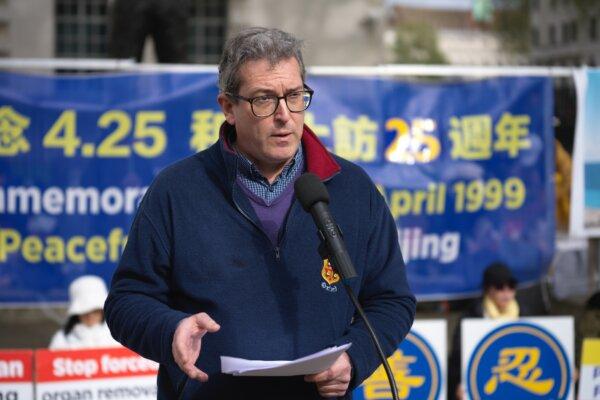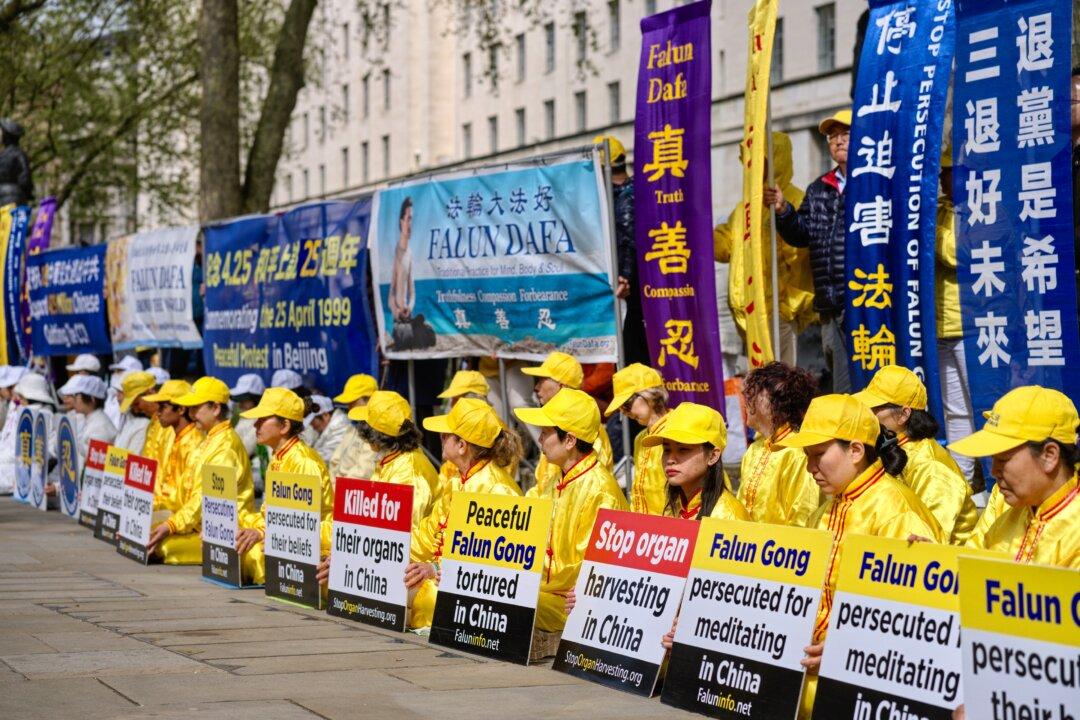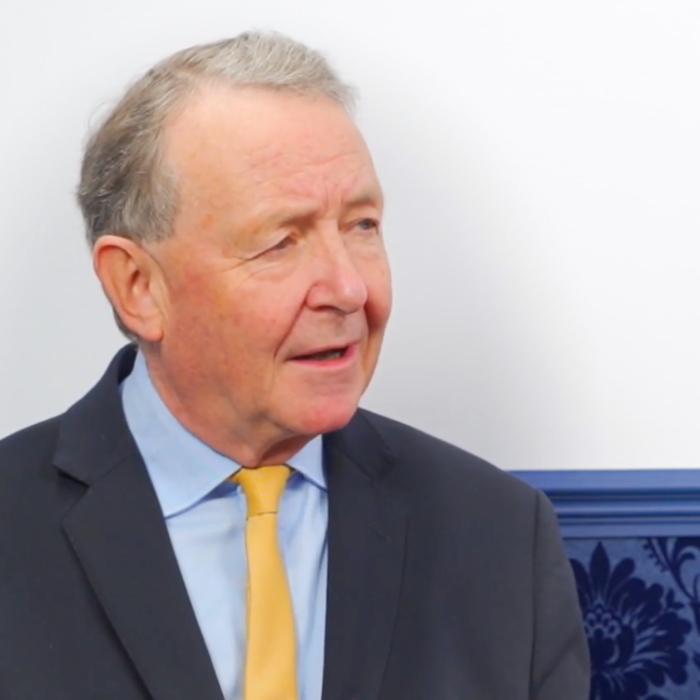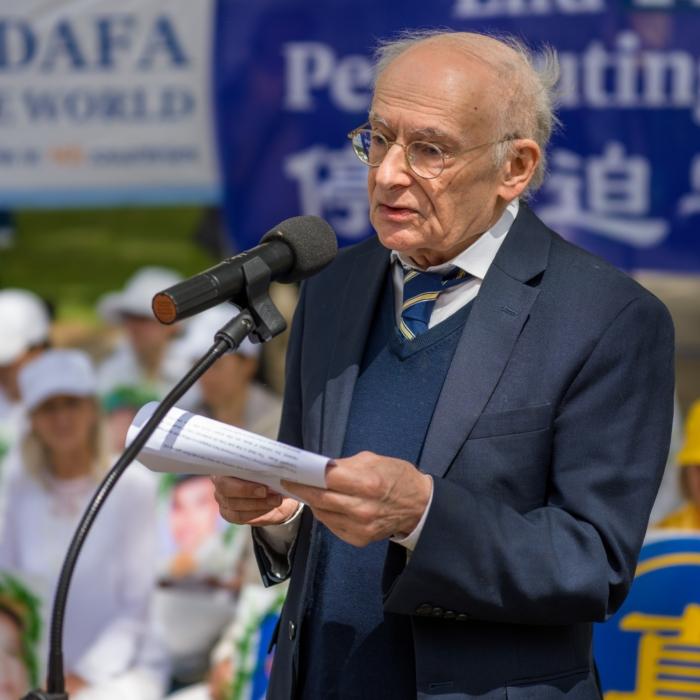Downing Street said the UK government is “deeply concerned” as the persecution of Falun Gong practitioners in China has lasted for 25 years.
Benedict Rogers, co-founder and deputy chair of the Conservative Party Human Rights Commission, said the persecution of the spiritual practice shows the communist regime can not be a reliable business partner, and called on the government to stop business as usual.
Edward McMillan-Scott, former British MEP and vice president of the European Parliament, said April 25—the day when thousands of Falun Gong practitioners staged a peaceful demonstration in Beijing 25 years ago—should be a “world awareness day.”
Falun Gong, also known as Falun Dafa, is a self-improvement discipline, with adherents taught to follow the principles of “truthfulness, compassion, and forbearance.”
Originating in mainland China in 1992, the popular practice attracted between 70 million to 100 million followers, according to various estimates, before former Chinese regime leader Jiang Zemin turned the state apparatus against it in 1999.
According to U.S. journalist Danny Schechter, on April 25, 1999, around 10,000 to 15,000 Falun Gong practitioners gathered around Zhongnanhai, the CCP leadership compound in Beijing, in a peaceful appeal. It came after riot police in nearby Tianjin used violence and arrested 45 practitioners who complained over a derogatory article.
Falun Gong previously said the group’s intended destination was the National Public Complaints and Proposals Administration office, which was located beside Zhongnanhai. Chinese Communist Party (CCP)-controlled media outlets claimed they were there to “encircle” the leadership compound.
The silent appeal initially appeared to have had a happy ending after then-Premier Zhu Rongji spoke to a number of representatives and ordered the release of arrested practitioners. However, three months later the CCP formally launched a campaign aimed at eradicating Falun Gong within three months.
Since then, adherents who refuse to denounce their beliefs have been subject to harassment, exclusion from education or employment, detention, torture, and killing, including by forced organ harvesting.
In a letter sent to Wei Liu, director of the UK Falun Dafa Association, seen by The Epoch Times, Downing Street said the government “remains deeply concerned about the persecution of Falun Gong practitioners and others on the grounds of their religion or beliefs in China,” adding, there is credible evidence to suggest that Falun Gong practitioners are subjected to serious mistreatment.
“The freedom to practice, change, or share one’s faith or belief without discrimination or violent opposition is a human right that all people should enjoy,” the letter reads.
“The government believes that societies which aim to guarantee freedom of religion or belief are more stable, prosperous, and more resilient against violent extremism.”
Scottish First Minister Humza Yousaf’s office said the Scottish Government also “remains deeply concerned” about the persecution of religious groups in China, and said it will “consider carefully” evidence on alleged abuses and organ harvesting.
“If true, the practice of systematic, state-sponsored organ harvesting would constitute a serious violation of human rights.”

Speaking at an event on Saturday marking the 25th anniversary of the 1999 demonstration, Mr. Rogers said Falun Gong’s principles are “universal values” that can be embraced by “people of all faiths and none,” and warned liberal democracies not to trust the CCP.
“To [Chinese leader] Xi Jinping and his thugs in Beijing: enough of repression, lies, torture, and killing,” he said. “And to the free world and the international community: enough of kowtowing, compromise, and business as usual.
“A regime that locks up and tortures people because they believe in ’truthfulness, compassion and forbearance' is not a regime that can be a reliable business partner. A regime that forcibly harvests human organs is not a regime that can be a trusted friend.
“A regime that breaks promises under international agreements—as it has done to Hong Kong; that separates children from parents by force and sends them to boarding schools where they are forbidden from practising their religion, living their culture or speaking their language, as it does in Tibet; a regime that tears down crosses, dismantles churches, and forces Christians to bow to images of Xi Jinping; a regime that threatens our own freedoms here at home, in our universities through Confucius Institutes, in our Parliament through cyber-attacks, in our markets through fake postage stamps as was recently reported … this is not a regime with which we can simply do business as usual.
“This is a regime that poses perhaps the biggest challenge of our time. It is a challenge which Falun Gong practitioners helped bring to our attention 25 years ago. And it is a challenge we must confront,” he said.
Mr. Rogers, who has been sanctioned by the Chinese regime over his human rights advocacy, said he supports keeping dialog open with the Chinese regime because “nothing is achieved by not talking,” but urged politicians to “put human rights at the very heart of their dialogue” and to “think twice about whether and how we do business with a criminal regime.”
Speaking to NTD, Mr. McMillan-Scott said the persecution against Falun Gong and others “has been a thread running through” the CCP’s “nightmarish politics” and made apparent the “true nature of the regime in Beijing.”
The former MEP, who was vice president of the European Parliament between 2004 and 2014, said former Prime Minister David Cameron, and others, made “made a big mistake ... in cozying up to Beijing.”
The former MEP said the status of persecuted minorities across the Chinese region needs to be raised at “every opportunity,” adding that April 25 should “be a world awareness day” as it was “the point at which Falun Gong turned from being a tolerated, respected, religious, and physical activity.”
“Many thousands died under torture in the years since. We can’t forget them,” he said.







